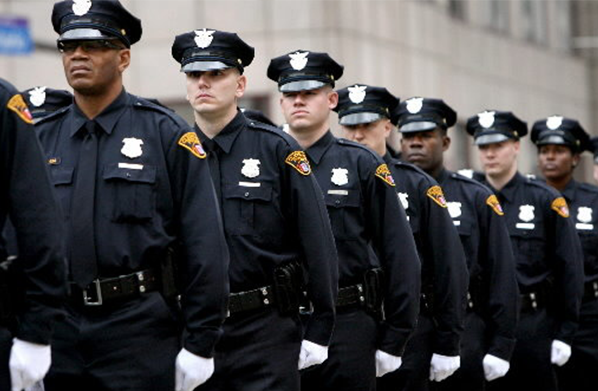Just today the headline is that the guy who killed a Kentucky state police trooper was shot dead by the police. Trooper Joseph Cameron Ponder, 31, a recent graduate of the police academy, was killed after he tried to stop a speeder on Interstate 24.
There have been so many officers killed recently in the line of duty, or while innocently filing their cars with gasoline. The murders and vicious anti-police rhetoric are making police justifiably more cautious about doing their jobs, and we are seeing the end of a two-decades long drop in violent crime.
Heather Mac Donald thinks that we are also seeing a fundamental shift in public attitudes that indicates that America's legal order is beginning to fray. She writes in today's Wall Street Journal:
But something more fundamental than even public safety may be at stake. There are signs that the legal order itself is breaking down in urban areas. “There’s a total lack of respect out there for the police,” says a female sergeant in New York. “The perps feel more empowered to carry guns because they know that we are running scared.”
The lawful use of police power is being met by hostility and violence, often ignored by the press. In Cincinnati, a small riot broke out in late July when the police arrived at a drive-by shooting scene, where a 4-year-old girl had been shot in the head and critically injured. Bystanders loudly cursed at officers who had started arresting suspects at the scene on outstanding warrants, according to a witness I spoke with.
During anticop demonstrations in Ferguson, Mo., last month, 18-year-old Tyrone Harris opened fire at police officers, according to law-enforcement officials, and was shot and wounded by police in response. A crowd pelted the cops with frozen water bottles and rocks, wounding three officers, while destroying three police cars and damaging businesses, Ferguson police said. “We’re ready for what? We’re ready for war,” some protesters reportedly chanted.
It has been disheartening to see the "protesters" at Ferguson treated for the most part as legitimate protesters. Undoubtedly, some good souls genuinely concerned about alleged police brutality are in the mix (even though the notion that Michael Brown was a victim of police brutality or was shot because of his race was discredited by the Grand Jury). But the many of the violent protesters are just as undoubtedly there because they are thugs who don't like law enforcement because it is bad for their businesses or lifestyles. The media persists in seeing them as honorable, if excitable, protesters.
And who are these people actually hurting? Well, the poor people who need the police to be visible in their neighborhoods. Mac Donald writes:
The irony is that the historic reduction of U.S. crime since the 1990s was predicated on police singling out African-Americans—for protection. Using victims’ crime reports, cops focused on violent hot spots; since black Americans are disproportionately the victims of crime, just as blacks are disproportionately its perpetrators, effective policing was heaviest in minority neighborhoods. The cops were there because they believe that black lives matter.
Thousands of African-Americans are alive today because of a law-enforcement achievement that now is in danger of being squandered. In the current eruption of violent crime, the overwhelming majority of victims have been black. The Baltimore Sun reported that July was the bloodiest month in the city since 1972, with 45 people killed in 30 days. All but two were black.
Police officials I have spoken with in recent months say that they long to hear America’s leaders change the tone of the national conversation before respect for the rule of law itself deteriorates further. They’re still waiting.
I recently wrote about New York Magazine's lionizing somebody sympathetic to #BlackLivesMatter who tweeted that a murdered cop (the officer who was shot in the back while filling his gas tank) had it coming. This is an example of the breakdown in a fundamental belief in our legal system.
Of course, the editors of New York Magazine work in a cozy East Side office and won't be as immediately affected by the breakdown of our legal system as less educated and affluent citizens.
THIS JUST IN: It is being reported that the Kentucky police killer was a Ferguson protestor.


